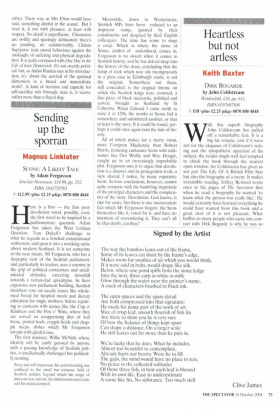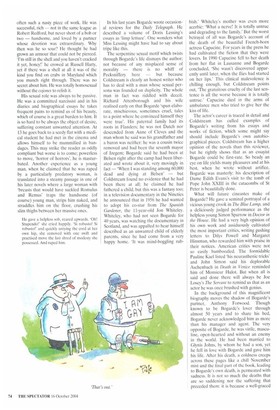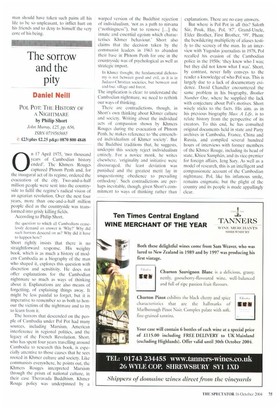Heartless but not artless
Keith Baxter
DIRK BOGARDE by John Coldstream Weidenfeld, £20, pp. 611, ISBN 0297607308 t £18 (plus £2.25 p&p) 0870 800 4848 With this superb biography John Coldstream has pulled off a remarkable feat. It is a big fat volume, and if it were not for the elegance of Coldstream's writing and the sympathetic appraisal of his subject, the reader might well feel tempted to chuck the book through the nearest open window, for Coldstream has given us not just The Life Of A British Film Star but also the biography of a twerp. It makes irresistible reading. Jeffrey Bernard wrote once in the pages of The Spectator that when he read a biography he wanted 'to know what the person was really like'. He would certainly have learned everything he could have wanted from this book and a great deal of it is not pleasant. What baffles so many people who came into contact with Dirk Bogarde is why he was so often such a nasty piece of work. He was successful, rich — not in the same league as Robert Redford, but never short of a bob or two — handsome, and loved by a partner whose devotion was extraordinary. Why then was he so sour? He thought he had grown an armour that could not be pierced. 'I'm still in the shell and you haven't cracked it yet, honey!' he crowed at Russell Harty, yet if there was a shell at all it was of the kind you find on crabs in Maryland which you munch right through. There was no secret about him. He was totally homosexual without the cojones to relish it.
His sexual role was always to be passive. He was a committed narcissist and in his diaries and biographical essays he takes frequent pains to remind us of his beauty, which of course is a great burden to him. It is so hard to be always the object of desire, suffering constant unwanted attention. At 13 he goes back to a seedy flat with a medical student he had met in the cinema and allows himself to be mummified in bandages. This may strike the reader as oddly compliant but worse is to come; powerless to move, 'horror of horrors', he is masturbated. Another experience as a young man, when he claimed that he was raped by a particularly predatory woman, is translated into a steamy passage in one of his later novels where a large woman with 'breasts that would have suckled Romulus and Remus' traps the handsome (of course) young man, strips him naked, and straddles him on the floor, crushing his slim thighs between her massive ones.
He gave a helpless sob, reared upwards. 'Oh! Stupendor she cried happily. 'Si robusto! Si robusto!' and quickly untying the cord at her own hip, she removed with one swift and practised move the last shred of modesty she possessed. And raped him.
In his last years Bogarde wrote occasional reviews for the Daily Telegraph. He described a volume of Doris Lessing's essays as 'limp lettuce'. One wonders what Miss Lessing might have had to say about tripe like this.
The serpentine sexual motif which twists through Bogarde's life dismays the author; not because of any misplaced sense of morality — there is no whiff of Pecksniffery here — but because Coldstream is clearly an honest writer who has to deal with a man whose sexual persona was founded on duplicity. The whole man in fact was riddled with deceit. Richard Attenborough and his wife realised early on that Bogarde 'spun elaborate, mischievous, sometimes cruel, tales to a point where he convinced himself they were true'. His paternal family had its roots in Flanders; he was not Dutch nor descended from Anne of Cleves and the man whom he said was his grandfather and a baron was neither: he was a cousin twice removed and had been the seventh mayor of Izegem; Bogardc said he had been at Belsen right after the camp had been liberated and wrote about it, very movingly in fact — 'When I was standing among 60,000 dead and dying at Belsen' — but Coldstream found no evidence that he had been there at all; he claimed he had fathered a child, but this was a fantasy too; in a television documentary in the Nineties he announced that in 1956 he had wanted to adopt his co-star from The Spanish Gardener, the 11-year-old Jon Whiteley. Whiteley, who had not seen Bogarde for 40 years, was watching the documentary in Scotland, and was appalled to hear himself described as an unwanted child of elderly parents, since he had come from a very happy home. 'It was mind-boggling rub bish.' Whiteley's mother was even more acerbic: 'What a nerve! It is totally untrue and degrading to the family.' But the worst betrayal of all was Bogarde's account of the death of the beautiful French-born actress Capucine. For years in the press he had cultivated the fiction that they were lovers. In 1990 Capucine fell to her death from her flat in Lausanne and Bogarde concluded, 'She wasn't discovered apparently until later, when the flies had started on her lips.' This clinical malevolence is chilling enough, but Coldstream points out, 'The gratuitous cruelty of the last sentence is all the worse because it is totally untrue.' Capucine died in the arms of ambulance men who tried to give her the kiss of life.
The actor's career is traced in detail and Coldstream has culled examples of Bogarde's writing from his essays and works of fiction, which some might say should include Bogarde's own autobiographical pieces. Coldstream has a higher opinion of the novels than this reviewer, but he rightly shows that as an essayist Bogarde could be first-rate. So beady an eye on life yields many pleasures and at his best, when he wrote without artifice, Bogarde was masterly: his description of Dame Edith Evans's visit to the tomb of Pope John XXIII in the catacombs of St Peter is beautifully done.
What will future cineastes make of Bogarde? He gave a seminal portrayal of a vicious young crook in The Blue Lamp, and a deliciously judged performance as the helpless young Simon Sparrow in Doctor in the House. He had a very high opinion of his own work and assiduously cultivated the most important critics, writing gushing letters to Dilys Powell and Margaret Hinxman, who rewarded him with praise in their notices. American critics were not so easily bamboozled. The formidable Pauline Kael listed 'his neurasthenic tricks' and John Simon said his deplorable Aschenbach in Death in Venice reminded him of Monsieur Hulot. But when all is said and done there will always be Joe Losey's The Servant to remind us that as an actor he was once brushed with genius.
In the background of this magnificent biography moves the shadow of Bogarde's partner, Anthony Forwood. Though known to be Bogarde's lover through almost 50 years and to share his bed, Bogarde never acknowledged him as more than his manager and agent. The very opposite of Bogarde, he was virile, masculine, open-hearted and without an enemy in the world. He had been married to Glynis Johns, by whom he had a son, yet he fell in love with Bogarde and gave him his life. After his death, a coldness creeps across these pages like a chill November mist and the final part of the book, leading to Bogarde's own death, is permeated with sadness. It is not so much the deaths that are so saddening nor the suffering that preceded them: it is because a well-graced man should have taken such pains all his life to be so unpleasant, to inflict hurt on his friends and to deny to himself the very core of his being.












































































































 Previous page
Previous page